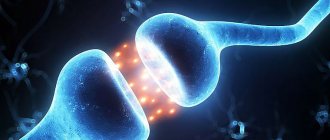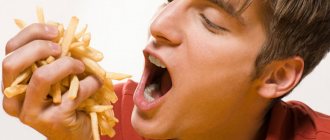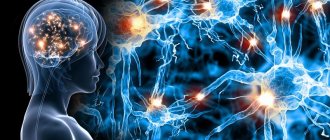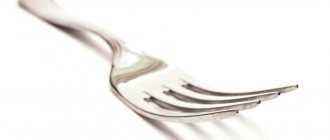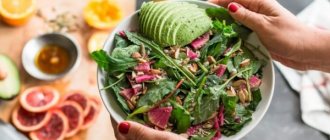05/26/2019 Olga Migunova 0 comments
If you are reading this, take the bun out of your mouth and hide the cervelat! Right now you will read about how to stop stress eating and cope with food addiction. Excessive gluttony is inappropriate behavior for an adult.
Food addiction is difficult to diagnose, because who among us does not like to treat ourselves to tasty treats from time to time? Frequent snacking and cravings for junk food can easily be explained by a busy schedule and lack of motivation and time for proper nutrition. That is why we will start with how you can identify food addiction due to stress.
↑ Food Diary
In order not to overeat during a nervous period in life, and not to turn this habit into your eternal companion, it is necessary to make the eating process controlled. Moreover, keeping such a diary will distract you from sad thoughts.
This is what a diary might look like:
| date | Time | The mood or situation that provoked a trip to the refrigerator | What was eaten |
| 11.11.17 | 3 a.m | Could not sleep | Three pieces of cake, a glass of milk, some chips and a piece of sausage |
| 12.11.17 | 7 am | Overslept for work | Cup of coffee and cigarette |
| 12.11.17 | 18 hours | Came home from work | Piece of pizza and coca cola |
| 12.11 17 | 23 hours | A little rest | Beer and chips |
In most cases, the next day a person, waking up with a headache and heaviness in the stomach, will not even remember the night's adventure, but all these fats will certainly settle in the form of plaques on the walls of blood vessels. And the entire next day, which is not replete with gastronomic delights, will not remain in the memory - only poor health and increasing stress will remain.
Of course, no one guarantees that a food diary will give instant results, but over time, this honest book about yourself will show how much food unnecessary for the body is absorbed per day. And this wake-up call will bear fruit in the form of breakfast in the morning and a good lunch, helping to avoid late-night snacking.
Habit from childhood
If you were rude in the minibus, I’ll eat a chocolate bar. Rain and wind ruined the styling - an excuse for cocoa and marshmallows. The annual report has been successfully submitted - you need to treat yourself to some cake! Sound familiar? Everyone has encountered a situation when, under stress, they want to eat, preferably sweets. The stress-eating connection exists for most people with excess weight problems. But where does this eating behavior “grow” from?

Elena Esner, psychologist of eating behavior
One reason can be found in infancy. Literally from birth, food is a habitual way to overcome a stressful situation.
What is the first thing a mother offers to a crying baby? That's right - the breast, and with it contact with the closest person, care, warmth and calm. But it is not at all necessary that the child wants to eat! The reasons for crying can be different: hot/cold, uncomfortable, scary, bored. But, instead of distracting the baby or eliminating the cause of discomfort, the mother calms him down with food. This is how the stress-food connection appears in our psyche.
Society contributes - think about it, food is essentially an accessible and socially acceptable way to deal with stress and gain pleasure.
Alcoholism, smoking, drug addiction are condemned, and a person with food addiction can work and be useful. So why not have a warm muffin and hot chocolate on another tough day?
Why the habit of stress eating occurs
Why do adults eat stress?
Let's consider the reasons for the stress-eating habit:
- The family treated food with extreme thrift; it was possible to eat enough only on holidays, when guests came, or they themselves went to visit. In this case, pleasant emotions will be associated with delicious food.
- Traditions were strong in the family; one of the old rules was sacredly observed at the table, thanks to which the saying appeared: “When I eat, I am deaf and dumb.” A reflex chain is developed: food is a refuge, or a more modern formulation: “When I chew, I am in the “house”, nothing touches me, and I do not touch anyone.”
- Unhealthy heredity, causing some special reactions of the nervous system, when excessive reproduction of cortisol is drowned out by food, without realizing it.
- Many people, in conditions of prolonged emotional instability, become apathetic; they don’t want to do anything, even take care of themselves and cook. But the body requires the supply of nutrients, and in case of emotional disorders they begin to actively “bite”, that is, they drag into the mouth everything that can drown out the feeling of hunger. And the fastest way to drown it out is with something sweet or fatty that does not require cooking - a piece of sausage, sweets, cakes...
Change your reaction
Whether you continue to binge or change your response is your choice. You can help yourself using a variety of ways.
- Analyze the situation, find the cause of stress and eliminate it. If you can’t figure it out on your own, consult a psychologist.
- Come up with alternative ways to relieve stress. This could be creativity (drawing, knitting, embroidery, etc.), reading, meditation, singing, yoga, sex, etc. As soon as you realize that you are feeling stressed, consciously switch from food to an alternative activity.
- Eat every 3-4 hours. The regime disciplines you, you don’t have time to feel hungry, which means there will be no reason for “harmful” snacks. And check your blood for vitamin D.
- Express your feelings on paper, write down what upsets and irritates you. And then tear this sheet into small pieces. The paper will endure, and you will feel better. then take a blank sheet of paper and write down what you are grateful for today. practice daily.
- Improve the quality of communication, learn to talk about your experiences and feelings. This will prevent you from accumulating negativity within yourself.
- Play sports. It's corny, but it works! When we eat stress, we chew, and the tension from the brain goes into the movement of the jaws. So why not move your legs, arms, butt?
- Use positive statements. Determine which emotion you are eating and write positive statements for it, repeat the statements every day. if you lack love, the following phrases are suitable: “all the tension has left my body”, “I forgive myself and others”, “I take great care of myself”, “I allow myself not to blame anyone”, “My friends are loving, caring and considerate,” “there is joy and love in my life right now.”
Acceptance of emotions
In order not to eat emotions, it is necessary for them to weaken and disappear. To do this you need to learn their emotions. According to the psychologist, when you feel negative emotions, do not run from them, do not try to distract yourself, but simply accept them. Tell yourself: “Right now I feel angry, angry, disgusted.” The main thing is to realize and voice what kind of emotion it is. Don't drive her away. Don't try to think about anything else. Accept it. Allow it to be with you, since it has arisen, recognize your right to internally react in this way at this moment. “Yes, I’m angry with the boss now, I just hate him!” - remember that any feelings that arise in us have the right to life. They are not good or bad. They simply exist and must be accepted.
“I’ll say right away that this doesn’t happen at once. The process of accepting emotions is not easy. But only by accepting our feelings over and over again can we free ourselves from them. Otherwise, our psyche will return negative emotions to us again and again. Until we accept them. Gradually you will notice that emotions begin to lose their power. Of course, we will not get rid of difficult emotions completely, but we can significantly reduce them. And the desire to eat negativity will decrease or disappear,” the specialist sums up.
Author: Anna Soboleva
How to identify the problem
How to stop feeling sorry for yourself - reasons for feeling pity, what it means
Before you get rid of stress eating, you need to study the psychology of this phenomenon.

Eating negative emotions is a path to worsening depression
Among the main characteristic signs of emotional hunger are the following manifestations:
- eating food is perceived as a “prize”;
- after a hearty meal, there is a desire to snack on something tasty, sweet and high in calories;
- the presence of excess weight is not perceived by a person as a problem and a health hazard;
- daily nutrition is based on fatty, fried and sweet foods;
- eating is devoid of any sense of proportion;
- in moments of sadness, irritation, resentment, there is a strong desire to eat high-calorie food;
- uncontrolled eating occurs at any time of the day.
If you have at least a few signs, it’s time to figure out how to stop eating bad moods and problems.
Obvious advantages and disadvantages of normalizing eating behavior
Are there benefits to stopping eating emotions? Let's get a look!
| Advantages | Flaws |
| By giving up “stress snacks”, you will save your figure from extra pounds and, accordingly, from grueling diets, mostly ineffective and harmful to health. And you will respect yourself - for your strength of character and the absence of dubious dependencies. | Of course, it will be a shame for a while: not only has something (or someone) ruined your mood, but you also can’t afford a chocolate bar with nuts. |
| A very good bonus: by not succumbing to the habit of “eating emotions”, you will not feel guilty later. | Of course, at first you will feel sorry for yourself. But here it is important to remember: self-pity is a person’s insidious enemy. It robs him of his willpower. |
| By being strict in this sensitive issue, you will take care not only of your external attractiveness, but, more importantly, of your health. | Changing your eating habits can affect your mood for a while. If you are accustomed to console yourself with sweets and buns for every, even the slightest reason, then without these “positive catalysts” it will be difficult for you to keep your emotions normal. |
| Having given up “stress snacking” and stopped indulging in your love of sweets, flour and high-calorie foods, you will definitely find other, more useful ways to stabilize your emotional background: walking in the fresh air, chatting with friends, reading books (only, mind you, without a box of macaroons under sideways!), sports, yoga, hobbies, art therapy. | Of course, alternative ways to harmonize your mood are more complex and require more effort than simply crushing a bag of croissants with a cup of hot chocolate. To play sports, you need to at least force yourself to take a hula hoop or go to the gym. |
| And one more thing: in general, problems and troubles should not be “seized” with buns and chocolates, but rather analyze the reasons for the current situation and draw conclusions. Then there will be fewer problems and a better mood. | By forcing yourself to honestly analyze your mistakes and stop consoling yourself with “yummy and sweet things,” you will deliberately make your life less comfortable: solving problems requires leaving your comfort zone. But only strong individuals can afford this. |
Typically, cravings for sweets are caused by cortisol (a biologically active stress hormone). The food a person eats during times of stress helps him overcome certain biochemistry in the brain.
How not to eat stress and fatigue
It is easier to overcome food addiction if you know the underlying causes. Food addiction is often genetic. If your parents are prone to overeating, there's a good chance you're also a stress eater. We also often eat out of boredom and lack of emotions and impressions. If you constantly feel like eating or ordering food from fast food, perhaps you simply have nothing better to do. Try new activities, diversify your daily routine.
Take note of 5 rules that will help you stop eating stress:
- During your meal, focus only on the food. When your mind is busy with something other than eating, you don't notice how you reach for more. Eliminate the phone, TV and reading during breakfast, lunch and dinner.
- Evaluate the quality of the dishes, enjoy their taste. Don't eat mindlessly or excessively.
- After eating, wait 10-15 minutes and ask if you want more? The feeling of fullness does not come immediately, so it is difficult to control.
- Stop beating yourself up for overeating. Diet breakdowns under stress are the norm. Don't despair and don't continue eating.
- Engage in calm physical activity: yoga, walking, aerobics. This will help reduce your stress levels and put an end to overeating.
The most important thing in how to stop eating stress is to defeat the root cause, and not psychological hunger. Learn to deal with stress correctly, and overeating will go away on its own.
Summary

Article Name How to stop eating stress: removing psychological hunger
Description Reasons why people start eating stress. How to distinguish real hunger from emotional hunger. List of undesirable foods for stress
How to break free from food addiction
If excessive and exclusive passion for food is animality, then arrogant inattention to food is imprudence, and the truth here, as everywhere, lies in the middle: do not get carried away, but pay due attention. Ivan Petrovich Pavlov
Ivan Petrovich Pavlov
If you don't know how to stop stress eating, start with psychology. A sustainable result in the fight against overeating will give:
- understanding how to get rid of stress,
- conscious attitude towards food.
Minimize stress
It is impossible to completely get rid of stress. It's part of life. But you can significantly reduce it by understanding the sources. There are two main causes of stress:
- non-realization of innate properties or a blow to values;
- inability to interact with people.
Stress from lack of fulfillment. Every person is born with potential that helps him realize the desires that are significant to him. For example, owners of the visual vector are born to feel, to merge their souls with another person, to feed on the colors and beauty of this world and, of course, to create it. But if their life is poor in emotions, they are limited in communication or locked in the office, as if in solitary confinement, they will feel the meaninglessness of life, boredom and melancholy. The loss of loved ones, separation, divorce becomes severe stress for them. Failure to realize these properties increases their level of anxiety and exacerbates their fears. Against the backdrop of such experiences, food cravings can develop into a serious addiction.
People with the anal vector eat grievances, lack of gratitude, and the inability to complete a task. Stress for them can be the constantly high rhythm of a big city, moving, changing jobs, exams, betrayal of a spouse.
Each vector has its own significant values, a blow to which can cause severe stress. Many people tend to compensate with food because it doesn't require much effort. And there is no knowledge of how to solve your psychological problem. And if you consider that a resident of a modern city has 3–5 vectors, the number of reasons to solve a problem with the help of food increases.
The training helps you understand your desires and talents and begin to live life to the fullest. Then the emptiness that was filled with the simple and short-term pleasure of food with many unpleasant consequences is filled with activities and events that bring real joy. A favorite activity and a loved one nearby help you feel much more pleasure. When we are carried away, we forget about food, or at least it is easier for us to distract ourselves from thoughts about it.
Other people as a source of stress. Other people often become the cause of our worries. We get offended by them, demand and do not receive attention. They irritate us with their fuss and stupidity.
A person who knows how to interact with people is a successful person. But how to achieve this? Why don't relationships work out with men (women)? Why doesn't anyone love me? Why did the boss do this to me? The answers to these questions come during the training, and stress resistance increases. When we understand values, desires, and “read” the thoughts of other people, life becomes more predictable, and the “flight or fight” reaction does not appear as often.
5.Love expressed in treats
Sometimes an unhealthy relationship with food is a consequence of your relationship with your mother. First, the mother feeds the baby, and feeding brings pleasure and gives a feeling of security.
Then mother and grandmother express their love and care through food: “I baked it especially for you,” “finish it, don’t upset me.” A stable connection is formed in the head: “food equals peace, tranquility, safety.”
Solution: learn to feel the love of loved ones through their attitude, comfort through self-care, learn to relax and rest without the help of food.
Be mindful of food
Analyze your eating habits.
Psychoanalysis, awareness of childhood traumas and habitual ways of reacting in different life situations establishes a connection between the conscious and unconscious. What is conscious ceases to influence us and is amenable to change.
There are many invisible levers in the subconscious that control life without our participation. We can start with the collective unconscious, that is, with the memory of humanity, which affects everyone. Ancient people also relieved tension from stress (at that time due to hunger) by sharing a meal. After a person has eaten, he feels better, and hostility towards his own kind goes away. We still unconsciously use the same methods of dealing with stress. But for us this is already an archetypal (outdated) approach to solving problems.
You can also remember what eating habits were ingrained in you since childhood. Perhaps you were force-fed, and the long-forgotten stress of force-feeding forces you to eat when you are already full, when there is no feeling of hunger. Or they calmed you down with candy when they couldn’t agree otherwise. You need to remember all this and realize how childhood behavior patterns laid down by your parents still influence you.
“Debriefing” is the subject of two thematic lessons on food at the “System-Vector Psychology” training, during which students have important realizations, and their attitude towards food and life in general changes significantly.
Become aware of the conditions that trigger the eating response.
Everyone would do well to take a closer look at themselves while eating.
Elias Canetti, writer, playwright, thinker
System-vector psychoanalysis helps to better understand yourself and your conditions. Previously, you did not realize that you were in fear, chronic resentment, or that your lack of joy in life was due to hidden depression. Once these conditions are understood, it becomes easy to track which deficiencies are being replaced by overeating. What becomes the trigger for eating “everything that is not nailed down”? Fear, anxiety, resentment? These are states characteristic of different vectors, which means you need to cope with them with knowledge of your psychological characteristics.
Imagine: you suddenly find out that the report is due tomorrow, and you only have half a day to complete it. Instead of concentrating and sitting down to work, you stop thinking at all, your thoughts run wild, and your legs themselves drag you to the refrigerator. When you come to your senses, you have already eaten too much and are even less inclined to work. You put it off until the last minute.
This is a typical reaction of a person with an anal vector. He reacts to sudden changes with stress, which puts him into a stupor. Food calms you down, but the desire to act remains even less. Knowing your properties, the desire to do everything as much as necessary for a high-quality result, you need to avoid such turns. You don’t want to make mistakes in a hurry, do you? Is the urgency really justified or is this someone’s extravagant decision not dictated by reason? This needs to be found out. If this happens all the time, is this the right job for you? This question needs to be answered, something needs to be changed in life, and the cause of stress will be eliminated.
Realize whether you are really hungry.
The best seasoning for food is hunger.
Socrates
At the moment when you want to have a snack, you need to stop and ask yourself the question: “Am I really hungry or just imagining it?” When there is a real feeling of hunger (physical, not emotional), even a crust of bread with salt will seem tasty to you. This is a test to see if you are really hungry. When you go through one dish and then another in your mind and cannot stop at anything, this means that, most likely, there is no hunger.
This is how the human psyche works: he experiences the greatest pleasure when he has accumulated a great shortage. The larger the size of the void, the greater its filling.
Try fasting for at least 24 hours (for example, from dinner to dinner), at least once, as an experiment to compare the pleasure of eating. After fasting, ordinary borscht will seem like a haute cuisine dish. And when you experience emotional hunger, you may endlessly eat chips, cookies, cakes, candies and not feel their taste. Because you are consumed by emotions and not by the taste of food. You are not enjoying the moment, but are caught up in excitement.
When you gain the experience of eating only after the feeling of real hunger appears, you will no longer want to fill your belly when there is no such desire. Because it doesn't taste good.
Is food a basic need or not?
If we recall Abraham Maslow’s famous pyramid of needs, we will see that the need for food and protection are adjacent basic human needs. Here we are similar to animals. But higher up there are steps related to the psycho-emotional sphere, which distinguishes us.
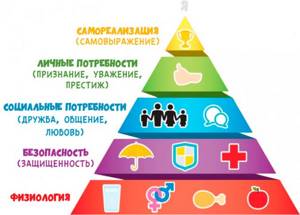
Why does it happen that stress from problems makes a person not solve them, but go down a notch and throw himself into the arms of the refrigerator? After all, everyone’s need for food is usually satisfied. It's not about hunger!
In psychology, the famous response of the human psyche to challenges, stress and problems is known: “Hit or flight!”
. People who are active and self-confident, whose 2nd stage of basic needs - protection and a sense of security are satisfied, do not strive to run away, for example, into food, but have the strength to strike.
But when there are big problems with a feeling of safety, comfort and protection, which can also include the unsatisfied higher level of the pyramid with socialization and love or recognition, then the person “runs away” to the very base - into food, “sex, drugs, rock -n-roll.” That is, it suppresses dissatisfaction at a higher level with an elementary, but emotionally powerful base.
Thus, an elementary basic need becomes a way to “escape” from a challenge: a problem or stress. But this behavior does not occur among all nations. Why is overeating more typical of Western civilization? What special concepts about food are embedded in it, since it has ceased to be something elementary like breathing or sleep?
Medical advice
What do the doctors say? For example, they suggest eating away stress, but only with healthy foods. This is a good way to lose weight, lower cholesterol and get your feelings in order. What are these products?
- Chanterelles. They contain a large dose of vitamin D, which reduces stress levels.
- Chocolate. Many people eat it when stressed. It improves mood and serves as a kind of medicine. But you need to eat it in moderation. Dose – 26-27 grams.
- Green tea. This drink reduces the level of cortisol, a stress hormone. If your cholesterol is high, you can also drink it.
It is important to reduce portions, eat only half, and eat slowly. There is no need to be afraid to turn to specialists; today many effective methods have been developed to help people with uncontrollable overeating
Perhaps this will help avoid many problems, such as cholesterol, obesity and diabetes.
Video: “Weight and stress. Hunger or stress eating?
4. The desire to hide, to protect yourself
Excess weight, which sometimes occurs precisely as a result of overeating, may have so-called secondary benefits. If a woman subconsciously avoids men, then the extra pounds become a kind of barrier that reliably protects her boundaries.
This behavior may be the result of sexual abuse or childhood negative attitudes about sexuality. For example, the mother was terrified that her daughter would “bring it in the hem,” and the father did not mince words, commenting on the teenager’s revealing, in his opinion, clothes. And he reacted instantly, protecting himself from threats associated with sex and relationships by gaining weight. And today, food helps us maintain the physical shape that keeps us safe...
Solution: learn to build boundaries when communicating with men, work on the topic of safety. Allow yourself to be attractive by untying the knots in your head that “sexy means provocative,” “femininity equals provocation.”
How to replace food - 11 options
There are many effective methods of dealing with stress without eating food. Moreover, they act no worse, and sometimes even more effectively. The easiest option is to include fatty fish, fruits and vegetables, bananas, and garlic in your diet. All these products stimulate the natural production of serotonin, but have virtually no negative effect on the body.
Physical exercise
This will be more than enough to produce endorphins without additional “fuel” in the form of food.
Moreover, even a 15-minute run will be enough to significantly improve your emotional well-being. Ideally, you need to exercise regularly, at least visit the gym.
Fitness also helps relieve boredom, especially in the evenings.
Cold shower
And at the same time, the production of adrenaline is stimulated (due to this, blood pressure increases and the heart begins to pump blood faster) and norepinephrine, which gives a feeling of vigor and energy.
The recommended shower duration is only 3 - 4 minutes, no more. Hypothermia should not be allowed, as this will weaken the immune system.
Tricky trick: eating with your left hand
Psychologists often recommend that those who suffer from overeating eat food with their left (or right for a left-handed person) hand. In general, make this process as inconvenient as possible for yourself.
After 2-3 days, there will be no trace left of overeating. A person will simply give up long meals and will eat as much as his body needs.
Surround yourself with red
perceives it as a “stop signal”.
Accordingly, it is recommended to use a maximum of red colors in the kitchen. This could be dishes, cups, an apron, an oven mitt, and so on. All this will help get rid of overeating.
Smile
begins to produce serotonin
Therefore, you should develop the habit of smiling in any mood. Sooner or later this will become part of normal life and the person will notice that he has significantly fewer stressful situations. In fact, he simply becomes less sensitive to these types of situations.
Singing
This will help you quickly get rid of even chronic depression.
But it doesn’t help everyone - for many, the very atmosphere of being “in full view of others” (if we are talking about karaoke) is scary. So it’s better to do this in private, maybe even in the shower. It is advisable to take care of soundproofing in advance.
Aromatherapy
You can take a bath and simply add a few drops of aromatic essential oil - purchasing them now will not be a problem, since they are sold in almost every pharmacy.
Drink as much water as possible
reduce cortisol concentrations
A few glasses of cool water will help reduce its concentration in the blood by about 10 - 20% (depending on individual physiology).
You can also try drinking soothing drinks, for example, green tea - it contains phytoncides, which also help reduce the excitability of nervous system cells. But you should not abuse tea or coffee - no more than 2 cups per day.
Eat a small piece of chocolate
will increase the level of serotonin in the blood.
Ideally, chocolate should be eaten in small portions throughout the day (you can eat a chocolate bar in 6–8 meals, but no more). Any products that contain cocoa act in a similar way.
You can also just drink a serving of hot chocolate. But you shouldn't make it too sweet. It’s better to add more cocoa to get a slightly bitter, sugary taste. It would also be a good idea to add a few mint leaves - it has a calming effect.
Watch a comedy
a universal method of combating any depression
Everyone definitely has several of their favorite comedies - it’s okay if a person has already seen these films before.
You don't have to watch comedies. Just your favorite movie will do. The main thing is that this is not a drama with a sad ending. It would be better if it were an animated film or even a few episodes of the series “Friends” - this is a universal method of dealing with stress.
Communication
this will already be enough to improve your well-being.
Another good option is to “pour out your soul” on some forum. This can be done anonymously and discuss everything you are interested in on this topic. Moreover, now it is possible to take advantage of free consultations with psychologists - many websites of private psychologists’ offices provide such a function.
Also pay attention to the infographic:

2.Bad mood
Food, and especially sweets, quickly lifts your mood. Someone has upset you, or you’re stuck at work, which means you need to eat a chocolate bar or a bun. Remember: these are fast carbohydrates, their effect is too fleeting. Very soon you will again feel sad, tired and need to buy candy again.
Solution: learn to eat well. Dishes, serving, serving, rather than the food itself, will lift your spirits. Eat in small portions, chew slowly - savor, enjoy. So you will eat less and bring yourself more joy.
Also, look for other ways to cheer yourself up.
The best way to stop eating anxiety is to smile
We usually smile when we feel good. Surprisingly, feedback works the same way - smile and your mood will lift.
Attention! It is not enough to smile and immediately lower your lips. You need to keep them in an elevated “smiling” state until your mood begins to inexorably creep up
Usually one or two minutes is enough for this. It doesn’t matter whether your smile is sincere or artificially forced.
This is explained simply: when you smile, the facial muscles press on biologically active points, the impact of which causes a wonderful mood.
Some people ask: “What if I’m not in the mood to smile?” And this is the wrong approach.
The mood is completely unnecessary here. Everything is exactly the opposite: stretch your lips, smile, even if not from the heart - and after a few minutes the mood will certainly appear.
The reviews of everyone I taught this to are unanimous: it’s very simple and works flawlessly.
What causes emotional eating?
Before you learn how to combat overeating due to stress, you need to understand the causes of increased appetite. The fact is that the level of nervous tension depends on the concentration of specific hormones. During emotional norepinephrine, absorbing large amounts of glucose and minerals. Therefore, at a moment of stress, a person has a desire to eat something high in calories.
Usually the choice falls on a simple source of carbohydrates - fatty and sweet. This is a kind of defense reaction and a way to relieve tension. At the moment of devouring your favorite dish, hormones of pleasure and joy are released - endorphins.
Experts note other reasons for uncontrolled eating:
- Congenital reflexes. Such behavior is embedded in the subconscious and is associated with childhood reflexes. So, a crying baby instantly calms down if he receives mother's milk. With age, a person develops the habit of escaping stress with the help of sweets. Cakes, sweets and chocolate smooth out feelings of loneliness and compensate for lack of attention. As you saturate, peace and tranquility come.
- Magnesium deficiency. Uncontrolled appetite may be the cause of a lack of microelements. Magnesium deficiency manifests itself in the form of nervous tension and irritability. To replenish the amount of the element, a person unknowingly begins to consume foods with high calorie content. Over time, rich and fatty foods become addictive. Their absence can cause stress.
- Difficult daily routine. Many people snack on the run during the day and overload their stomachs in the evening. Thus, the meal turns off thoughts from problems and brings peace.
The fight against emotional eating has deep roots. Therefore, this condition requires consultation with a nutritionist and psychologist. A specialist can identify the characteristic signs of the disorder and determine its cause.
Important! It is much easier to cope with the problem at an early stage, so you need to diagnose the disease in time and take appropriate measures. To find the root of evil, it is advised to record in a notebook the reasons that make you overeat, look for patterns and listen to your feelings
To find the root of evil, it is advised to record in a notebook the reasons that make you overeat, look for patterns and listen to your feelings.
